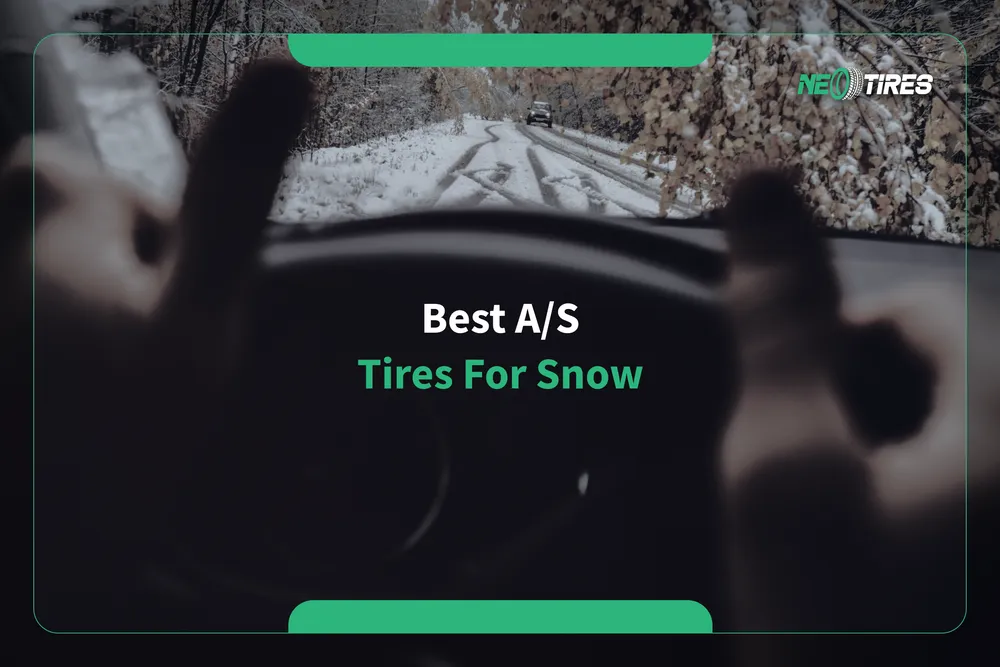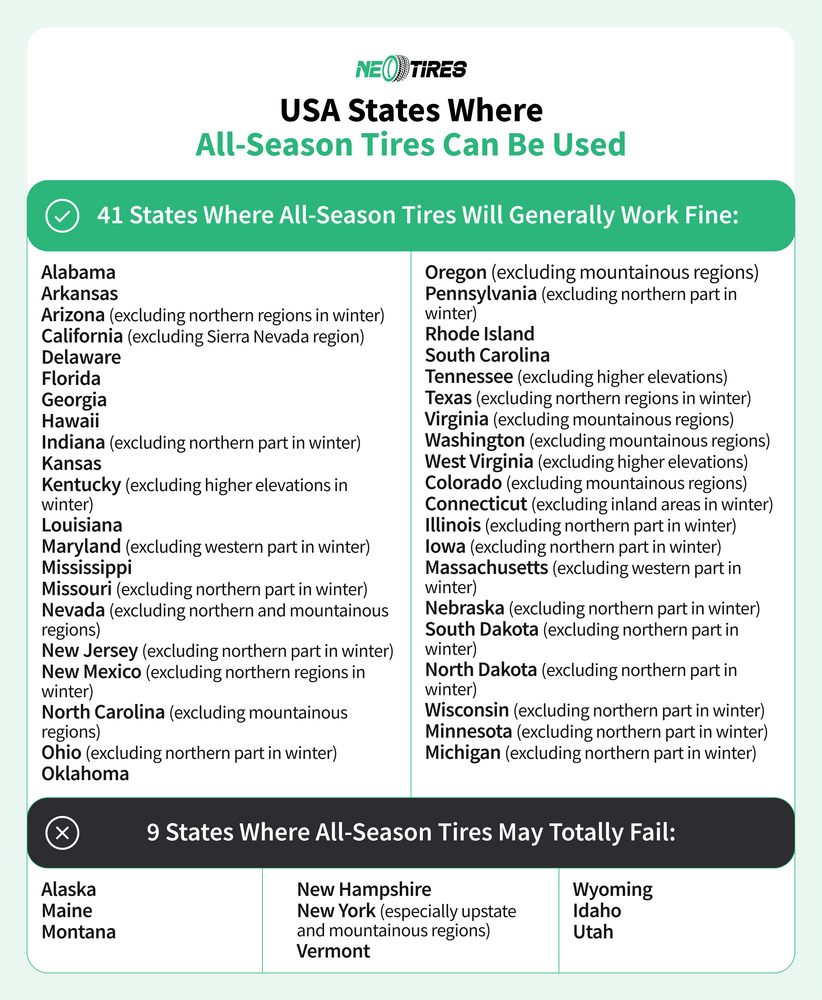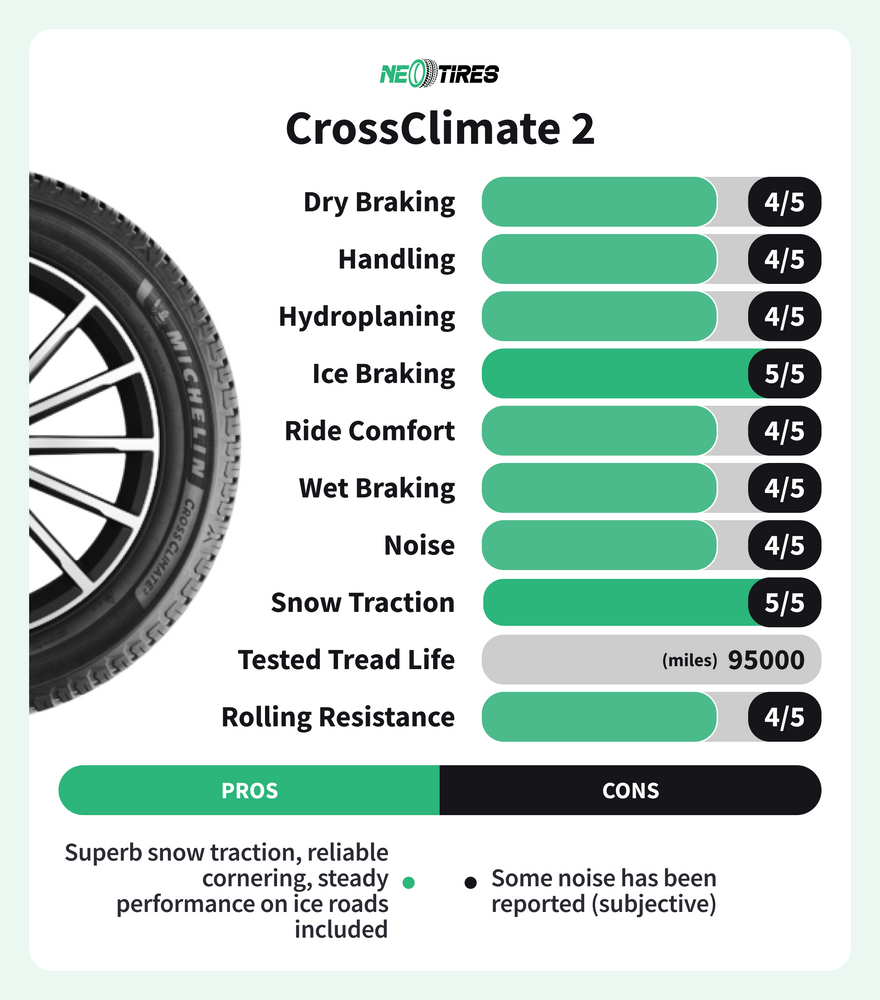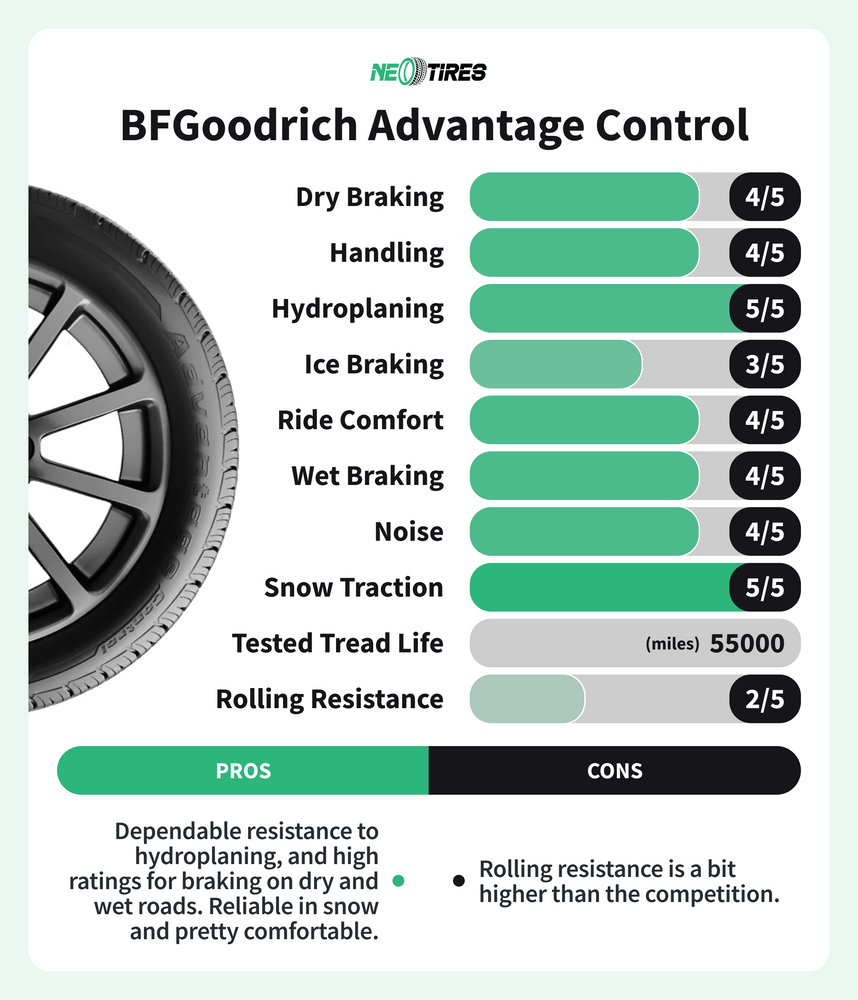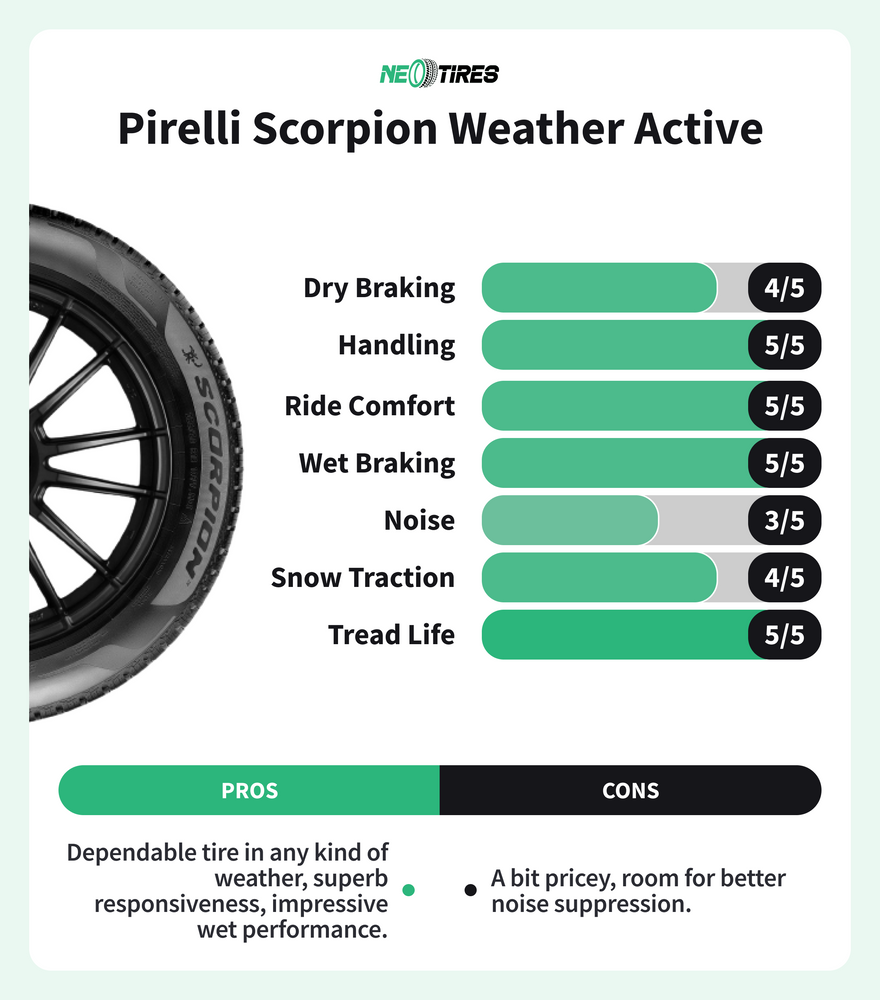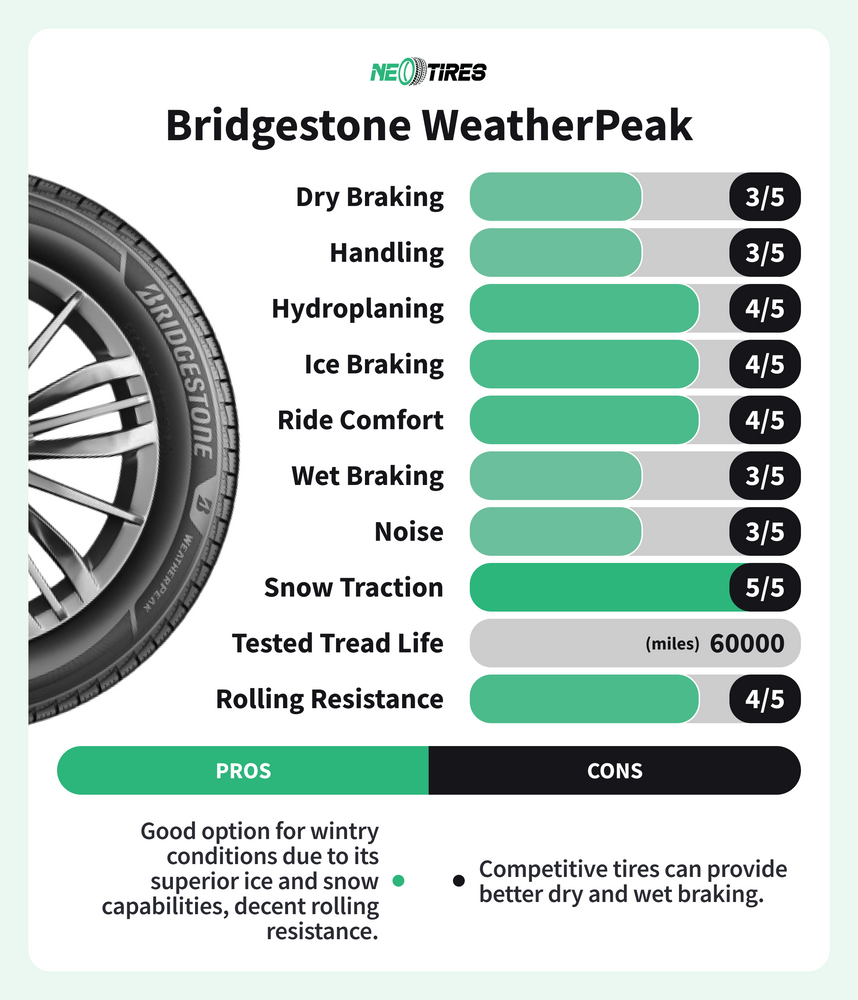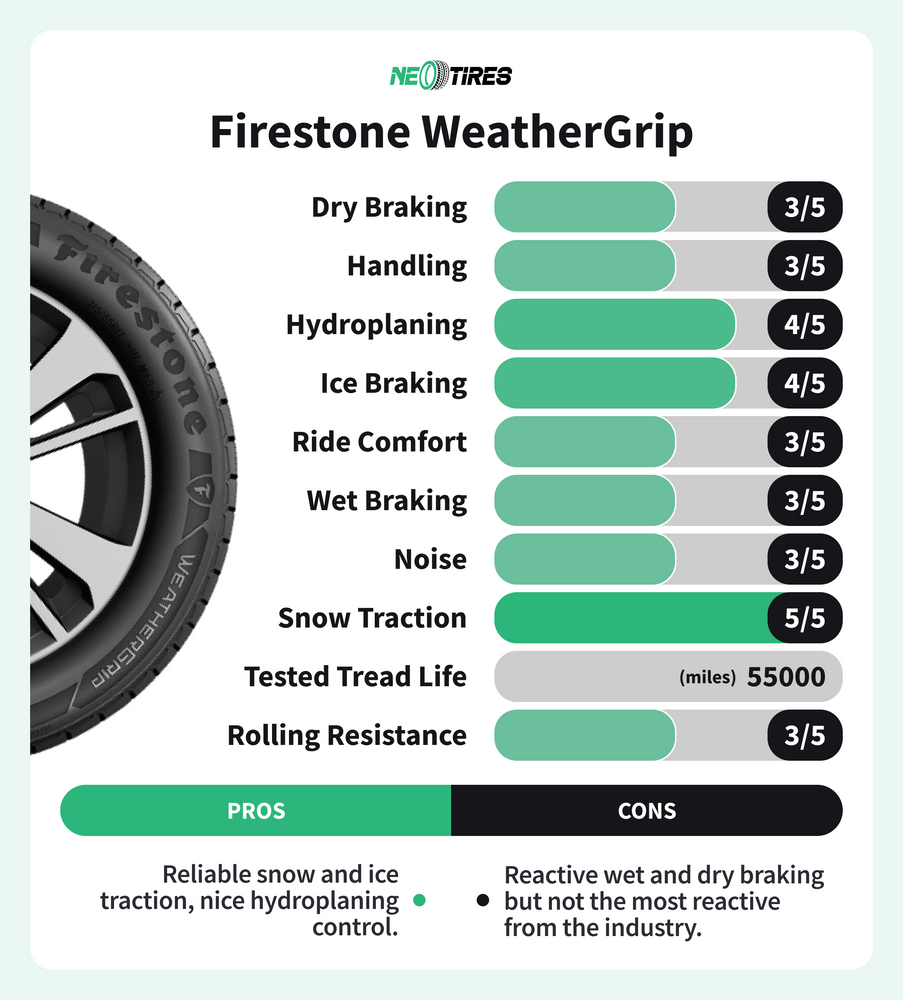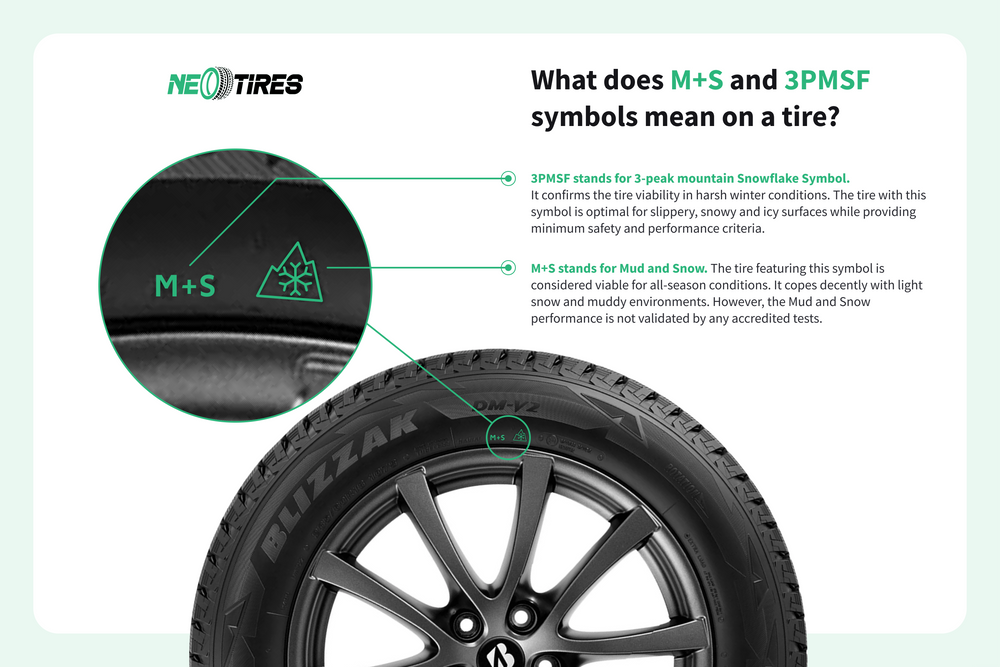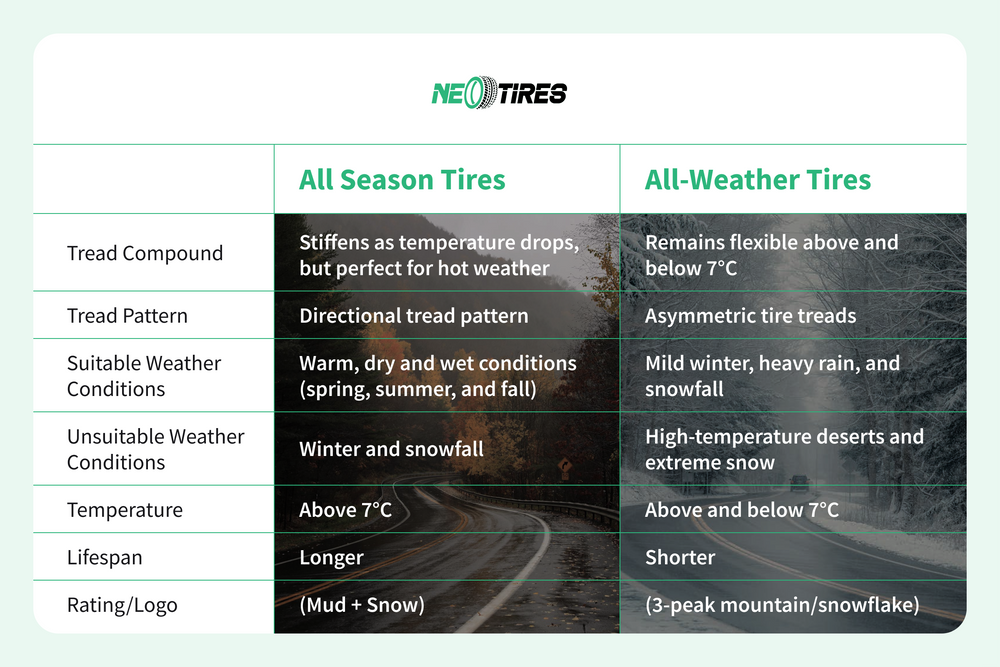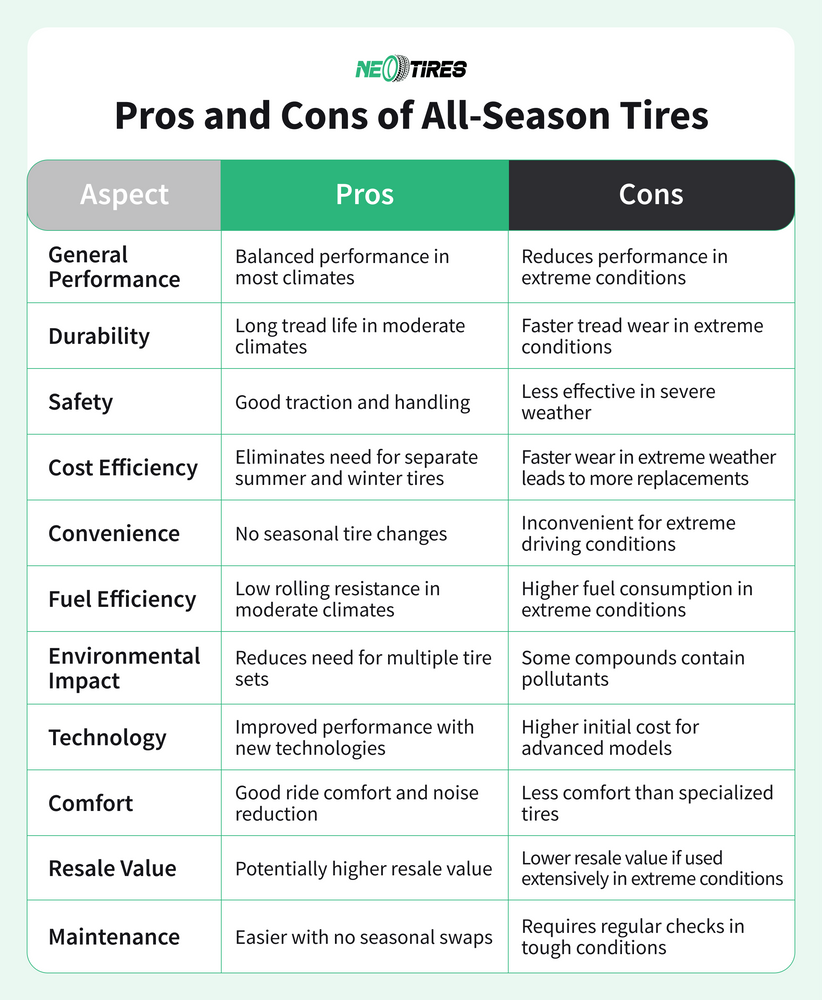According to Michelin, all-season tires are the most popular tires on the road, crafted to handle daily driving needs. They combine universality and comfort, serving drivers in different weather conditions. Their popularity is due, among others, to their reliable traction on different roads. As you all know, efficient traction is one of the most important aspects of an all-season tire, and not only that.
The tire offering dependable traction is equal to increased control over vehicle driving and handling. However, each of us knows that not all all-season tires are optimal for snow. That is, we can expect decent traction in winter conditions, but to an average extent when the snow is light. What about heavy snow? Are there all-season tires that would cope with the more difficult winter conditions? You bet.
We have compiled several models of all-season tires that promise the most reliable traction and safety in the category. One important note, though: these will not replace specialized winter tires for extreme winter conditions. So, if you live in such areas, we recommend looking for the best winter tires to rely on. The following all-season tires offer the best winter traction from the entire range of this category. So, if you need the best all-season partner for wintery conditions, look no further.
Before we delve in, I'd like you to consider the areas where all-season tires are considered a great option and where they might not work enough. Please take this into account before purchasing any type of tire for the cold season.
Michelin CrossClimate 2
You might have heard about how fabulous this tire is in terms of performance. The Crossclimate 2 line is available in a wide array of sizes. So, almost any type of vehicle can find a faithful ally in it.
The specific construction of this tire allows it to perform at a higher level than other models, especially on wet and snowy roads. Most of the reviews, including Consumer Reports, are positive regarding its solid control and responsiveness. Among all-season tires, this model bites the snow the most efficiently. At the same time, the tire rolls steadily on the snowy road biting quietly aggressively from it and removing it from its path through the deep grooves.
The shortcoming reported by customers mainly refers to the noise they generate. In addition, a certain percentage of drivers appoint a little stiffer ride compared to other in-class options. However, CrossClimate 2 snow traction seems to overshadow these drawbacks.
A superior advantage of this model is its performance on wet roads. According to statistics, the braking distance on the wet pavement of the Michelin CrossClimate 2 is up to 17 meters shorter.
BFGoodrich Advantage Control
This model is a good offer for those looking for all-season grand touring tires. The Advantage Control has a fairly complex architecture to perform decently in snowy conditions. The rating of the model is very high in different performance segments. Moreover, the model seems to be less fuel efficient than its CrossClimate rival.
In addition, the Advantage Control model is available at a very advantageous price, which makes it extremely attractive for those looking for a price-wise all-season grand-touring tire. Both in wet and dry conditions, the tire offers a pretty nice ride quality, even at the price of a higher rolling resistance.
Thus, here we see the first shortcoming of Advantage Control, which is its fuel efficiency. You will not visit the gas station very often. Still, in any case, a bit more often than with other tires in the category.
Another not-so-gratifying aspect is the life cycle of the Advantage Control tire. While it has a rating of 700, the tread seems to wear out relatively early. In addition, the tire provides a relatively lower grip than the Michelin model. However, its firm winter performance and the overall value it brings through its universality make it worth it.
Pirelli Scorpion WeatherActive
This model is part of the SUV-Crossover all-season touring tire category. In a word, this tire provides "sporty" driving, even if the category of these tires does not have much in common with the sporty vibe.
According to the ratings and reviews, this model is decent in snow traction, which means you can rely on it better than other all-season offerings. What you probably won't like too much is the price of this model. But, it's a Pirelli, after all, so we're not talking about a budget tire maker.
Another shortcoming is the limited variety of sizes. This line is predominantly addressed to high-end luxury car owners, I hope we have such readers here.
In short, the Scorpion WeatherActive promises superb traction and grip in various conditions, wonderful communication and responsiveness, as well as impressive braking and accelerating including in winter environments.
As for the shortcomings, well, you know- the price is the most "painful" of all. Also, Pirelli could have suppressed noises better.
Bridgestone WeatherPeak
This tire has a common feature with all the ones mentioned above: it also has a treadwear rating of 700. In other words, it will serve reliably up to approximately 70,000 miles. The good thing is that this model is more affordable than its Michelin competitor. The bad part is that it is slightly less responsive to the driver's tasks. This tire is notable for its nice ride quality and pretty decent snow traction. At least, better than other models in the class.
The grip of the tire leaves a bit to be desired as the wet and dry braking is a bit inferior compared to other rivals. It seems that Bridgestone has prioritized comfort in this model, leaving road adherence on the secondary level. However, the tire records better results in all-season conditions than many other in-class members. Check this out:
Firestone WeatherGrip
I will round up the listing with the WeatherGrip model, which we find very reliable for handling winter conditions. This tire has a slightly lower tread rating than the previous models. It's about a 640 rating. However, this model excels in its snow traction ratings and amazes with its comfort quality. If you drive in mild to moderate winter conditions, it definitely stands out from the competition.
The icing on the cake is its reasonable price. If I have to nitpick a little, there is room for better in wet and dry traction. I mean, this is at a fairly decent level, but the competition shows that it can be better. However, the wide variety of sizes and the reliability in light snow conditions eclipse this shortcoming for most drivers.
Three Peak Mountain Snow Flake Standard
I'm sure you've heard of this standard previously. Its symbol is present on the sidewall of the tire if it withstands severe snow conditions. Tire makers perform various tests in which they subject all-season, winter, and all-weather tires to different harsh conditions. The criteria for these tests are regulated by the U.S. Tire Manufacturers Association.
The symbol on the tire sidewall confirms that the tire meets these requirements and is suitable for safe and secure traction on packed snow. The tests mainly measure the traction force and tire stability and do not take into account ice braking and cornering.
If the all-season tire has this symbol, it means that it is more capable than an all-season tire without this symbol. Some all-season tires have the "M+S" symbol. They cope decently with mud and snow conditions thanks to their special architecture. Still, M+S tires are not highly reliable in deep snow.
If we talk about traction on packed snow, a 3PMSF tire will perform better than the M+S. Some tires have both symbols, which speaks of their wider universality. Also, all winter tires have "M+S" markings, but not all tires with "M+S" are winter tires.
Which Of The 5 Models Has 3PMSF Standard?
All 5 above-mentioned models include the capabilities of an M+S tire. This means that they all cope quite decently with light snow and mud conditions. Thanks to their special structure, all these models effectively remove mud and slush. However, not all of them have been evaluated for the 3PMSF standard.
All-Season Tires FAQs
Is it Worth Getting All Season Tires?
The specifics of all-season tires consist of dependable wet traction, great hydroplaning control, and weather versatility. These tires resist well to temperature transitions from mild warm to mild cold. If these aspects characterize your usual driving, then all-season tires might be a great option for you.
Can I Use All Season Tires in Winter?
Even if the term "all-season" suggests versatility in any weather conditions, most all-season tires are actually limited to use in mild weather conditions. This means that, as a rule, these tires do great in cold and warm temperatures whenever they do not reach extremes. Most all-season tires have the M+S symbol, meaning they perform decently in mud and snow conditions.
However, they do well when it comes to light mud and light snow. If the winters are difficult with a lot of deep snow and ice, a set of winter-dedicated tires will be more suitable. Tires with the 3PMSF symbol are a decent alternative for harsh winters.
Which Tire is Better All-Season or All-Weather?
All-season, all-weather, and winter tires are compatible with cold temperatures. But each of them is intended for a certain threshold of cold. If we talk about winter conditions, snow tires are the most efficient. All-weather tires are slightly inferior for the cold season but offer versatility even in the warm season. All-season tires are the most sensitive to winter conditions, being somehow a hybrid between all-weather and summer tires. All-season tires do well in snow, but only if it is light snow. All-weather ones are a bit more competent for winter.
Are All Season Tires Good in Summer?
The specific formula of all-season tires makes them usable even in summer conditions. Drivers can use them in warm weather, but they should not expect the same performance as special summer tires. All seasons perform decently and smoothly, but in any case, they are slightly lower in grip, agility, steering response, and braking than the summer ones. These shortcomings are explained by the fact that all-season tires are also meant for light winter conditions. Accordingly, manufacturers have to sacrifice some performance aspects in order to provide weather versatility.
How Cold is Too Cold for All-Season Tires?
As a general rule, all-season tires are usable at temperatures around 7° Celsius or 45°F. The colder it gets, the stiffer the rubber becomes. Along with the tire's stiffness increment, it reduces its efficiency and traction. Some modern all-season tires resist well at temperatures around zero degrees, which makes them pretty usable even in light snow conditions. If the temperatures drop well below zero, a set of winter tires is highly recommended.
What Temp Are All-Season Tires For?
For maximum safety and performance, all-season tires should be used at temperatures around 45°F or 7°C. This is the optimal temperature for maintaining the pliability of the all-season tire. As the temperature rises, the all-season tire will perform decently, but not as tenaciously as a summer tire. Once the temperature drops below 7°C, all-season tires will provide acceptable performance but not as reliable as an all-weather or a winter tire.
Are All-Season Tires Good in Rain?
Generally speaking, all-season tires perform reliably in wet conditions. Their special tread pattern takes into account the rapid and efficient evacuation of water to reduce and control the effect of hydroplaning. In addition, the wet traction of all-season tires is usually appreciable.
How Long Do All-Season Tires Last?
Each tire manufacturer uses specific techniques and special components in its all-season tires. Some of them use more advanced technologies, others limit themselves only to what is strictly necessary. Thus, all-season tires last differently over time, between 4 and 5 years. The durability of all-season tires depends on the technique and materials used, driving style, road and weather conditions, as well as tire maintenance. With good maintenance and reasonable driving habits, all-season tires can last up to 5 years.
What Are 2 Disadvantages to Using All Season Tires?
If used according to their purpose, all-season tires have almost no shortcomings. These provide decent performance, weather versatility, and a pretty long lifespan. However, they will show their shortcomings if you use them in harsh winter conditions. Their efficiency in deep snow is generally lower than winter-dedicated tires. Some manufacturers produce exceptional all-season tires (like those mentioned above). However, they generally provide less winter efficiency compared to snow-specialized tires. Another disadvantage would be the price. Some models are more expensive than other types of tires.
Why Trust Us?
Neotires has been active for more than 5 years in the tire industry. It is a relatively short term, but we managed to obtain huge results during this period. And we're not just talking about selling tires.
Our team concentrates on people with extensive experience in the automotive and tire industry. We have mechanics, testers, content writers, and customer care assistants who pursue the same goal: to provide efficient and professional service and products to our end customers. Our goal is not to sell tires. Rather, we focus on the needs of customers and match them with the right tires.
Apart from that, we spend a lot of time in our own "laboratory", i.e. our service center. There we test the tires in various conditions and review them to provide quality information to our readers. Last but not least, we closely follow trends and innovations in the industry to keep up with new technologies and advancements. All this helps us to become loyal allies to the thousands of drivers we have already assisted. Feel free to join them. We are happy to assist you in anything related to tires and driving safety!




